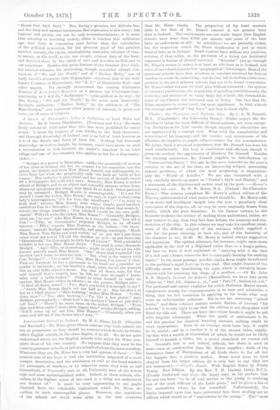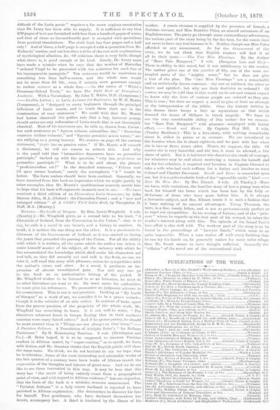; the Olympian and Pythian Odes. By C. A. M.
Fennell, M.A. (Cambridge : the University Proesa—Pindar enjoys the die. {auction of being the most difficult of Greek authors, not even except- ing sEschylus in his lyric moods, though happily his ebscurities are not aggravated by it corrupt text. What with the complexities and inversions of his language, and the number and remoteness of his allusions, he supplies an ample subject-matter for the commentator. We judge, from a practical experience, that Mr. Fennell has done his work satisfactorily. His help is continuous and efficient, though it gives the student tho opportunity of thinking for himself. Besides the running annotation, Mr. Fennell supplies an introduction on " Pinder and his Poetry." We nate in this some remarks on the poet's relation to the art of his time, an interesting subject, presenting several problems, of which the most perplexing is unquestion- ably the " Shield of Achilles." We are also furnished with a very carefully drawn-up paper on " Piudar's Style and Dialect," and a statement of the rhythms and metres used by the poet—Homer's Odyssey, xiii.xxiv. By W . W. Merry, M.A. (Oxford : the Claeondon Prossa—This volume completes Mr. Merry's school edition of the Odyssey, quite a model of what such a work should be. Mr. Merry adds to an matte and intelligent insight into the text a peculiarly clear conception of the objects, all, we may be sere, originally drawn from reality, which the poet describes. In his former volume, he did Homeric students the service of making thom understand, bettor, we may venture to say, than they had done before, the economy and con- struction of the ship. In this volume we may note his excellent treat- ment of the difficult subject of the atagissis, which supplied a test for the great shooting in book xix., acid ef the fastening of the chamber in xxi., 45-50. Mr. Merry is indeed always suggestive and ingenious. The epithet &anus's, for instance, might seem more applicable to the roof of a Highland cabin than to a king's palace, but here we have it well explained as " carrying with it the idea of a rich man's house, where the fire is constantly burning for cooking feasts.'' In the same passage, asat56ei eirdmi ti.rrtp, might be referred to the goddess's rapid flight up to the roof. This might dispose of the difficulty about her brandishing the iegis, whieh is certainly incon- sistent with her retaining the shape of a swalloa .—Of Mr. John E. B. Mayor's ,Taveital for Schools (Macmillan), we have two parts before us, "Part III., Satires x., xi.," and "Part 1V., Satires xiiaxvi." The profound and varied erudition for which Professor Mayor stands; conspicuous among his contemporaries is so rare and admirable a thing, that we feel hesitation in applyiug to his books what may seem an unfavourable criticism. But as we are reviewing "school books," and these volumes contain certain Satires of Juvenal "for schools," it is only right to say that the edition is not altogether well fitted for this use. There are boys into whose hands it might be put with singular advantage. When the spark of enthusiasm is lit, and the passion for classical learning aroused, nothing could be more appropriate. Even to an average sixth-form boy, it ought to be useful ; and to a teacher it is of the utmost value, supply- ing him with a wealth of illustration of which ho would not be likely himself to furnish a, tithe ; but a model eines-book we cannot call Juvenal's text is not, indeed, difficult, but there is need of more notes on construction than Mr. Mayor supplies ; while of the bounteous feast of illustrations of all kinds there is, for all but the happier few, a positive surfeit. Some notes seem to have strayed from the larger edition (it is only fair to say they are not numerous).—Vireil's Alma With English Notes by Henry Young. Now Edition. By the Rev. T. II. Lindsay Leary, D.C.L. (Crosby Lockwood and Co.)—Dr. Leary says in his preface that his aim has been "to be of real service to the young in studying one of the most difficult of the Latin poets," and he gives a list of the authorities whom he has consulted. Unfortuuately, tho limits imposed upon -him have prevented him from sending out an edition which would be of "real service to the young." The "most difficult of the Latin poets" requires a far more copious annotation than Dr. Leary has been able to supply. It is sufficient to say that 239 pages of text are furnished with less than a hundred pages of notes, and that of those no inconsiderable part is occupied with quotations from poetical translations, The sixth book has four pages and a half only And of these, a half-page is occupied with a quotation from Mr. Rielcards' version, and not less than a tithe of the rest with explanations of mythological allusions, &c. Of criticism there is very little, though what there is, is good enough of its kind. Surely, Dr. Leary must have made a mistake when he says that the mother of Marcollus "ordered Virgil to be presented with ten sestorces for each lino of his incomparable panegyric." Ten sesterces would be equivalent to something loss than half-a-crown, and tho whole sum would not be more than 23 10s, even if octavia wore generous enough to reckon owners as a whole line.—In the series of "White's Grammar-School Texts," we have The Fifth Book of Xenophon's Anabasis. With a Vocabulary. By John T. White, D.D. (Longmans.) —Aurcilia Latina ; or Latin Leasons for Beginners, by W. H. Morris (Lougmans), is "designed to carry beginners through the principal inflexions of Latin words, and to teach them their use in the construction of easy sentences." We could wish that Mr. Morris had better observed the golden rule that a boy, however young, should never see any collocation of Latin words that is not thoroughly classical. Most of his sentences are, he tells us, drawn from Ccesar ; but such sentences as " Agmen vulnera animalibus dat," " Exercitus senatum ictibus vulnerat," and "Species perniciei aciorn torret," are not edifying to a young learner. We observe on page 81 the curious statement, "fugio has no passive voice." If Mr. Morris will consult a dictionary, he will see reason to retract this. And why is the pupil told that "intransitive deponents have no gerundive participle," backed up with the question, "why has pro flei8COT no gerundive participle ?" What is to be said about the phrase, " proficiscendum est i" In the detached sentence, "Polices aunt illi (loos omnes laudant," surely the unemphatic "ii" would be better. The form melons should have been omitted. Generally, we have received from this book an impression which we might justify by other examples, that Mr. Morris's qualifications scarcely entitle him to hope that his book will supersede manuals now in uso.-----We have received a third edition of an Elementary Latin Grammer, by John Barrow Allen, M.A. (Oxford : the Clarendon Press) ; and a "new and enlarged edition" of A Child's First Latin Book, by Thoophilus D. Hall, M.A. (Murray.)



































 Previous page
Previous page